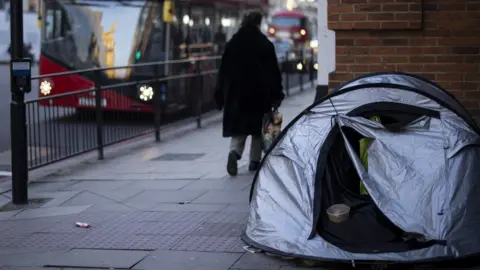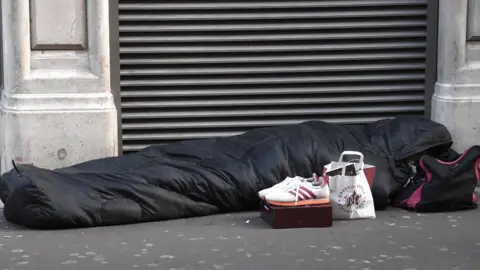London had biggest rise of rough sleepers in 2022, report says
 EPA
EPALondon has had the biggest rise of rough sleepers in England according to government figures, with an increase of 34% across a 12-month period.
There were an estimated 858 people sleeping rough in the capital on a single night in autumn 2022, compared to 640 the year before.
The government data found that rough sleeping had increased in every region of England year-on-year since 2020.
The government said figures were below pre-pandemic levels.
But it added there was "more to do" to help those at risk.
Almost half (47%) of all people sleeping rough on a single night in autumn 2022 were in London and the South East, the report found.
Under the metric, Westminster in London saw the biggest increase across England, with 250 rough sleepers - up by 63 from 187 in 2021.
Camden was the second highest, with a total of 90 rough sleepers in the 2022 report.
The City of London authority area had also increased by 23 people to 43 rough sleepers.
Mayor of London Sadiq Khan, Labour, described the findings as "extremely alarming and further evidence of the devastating fallout from the cost-of-living crisis".
He said: "It is high time ministers got a grip on the escalating food, energy and housing crises and restored the social security safety net which helps stop people becoming trapped in a cycle of homelessness."
Rick Henderson, chief executive at Homeless Link, which is the national membership charity for frontline homelessness organisations, said the rise in rough sleepers in England of more than a quarter year-on-year since 2021 "is evidence of how the cost-of-living crisis has exacerbated long-standing drivers of homelessness".
He urged the government to take "urgent action to keep homelessness services open" by increasing funding in line with inflation.
The government has previously stated its intention to bring forward legislation this year to ban Section 21 no-fault evictions, which currently allow landlords to quickly evict tenants without having to give a reason.
 EPA
EPAA spokesperson for the Department for Levelling Up, Housing and Communities said: "Over half a million households have been prevented from becoming homeless, or supported into settled accommodation since 2018, and rough sleeping remains well below pre-pandemic levels.
"But we know there is more to do to help families at risk of losing their homes and to end rough sleeping for good."
They added the department was investing £2bn over three years to tackle the issue allocated to areas with the greatest need.
"This includes financial support for people to find a new home, working with landlords to prevent evictions or providing temporary accommodation, among other preventative measures," they added.
"Councils have a duty to ensure families are not left without a roof over their head."

Follow BBC London on Facebook, Twitter and Instagram. Send your story ideas to [email protected]
